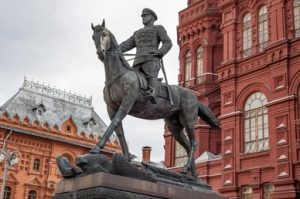Use to discuss topics unrelated to recent posts.
Month: August 2024
 This is the first in a series of articles on Russian grand strategy.
This is the first in a series of articles on Russian grand strategy.
As sure as the sun rises in the East and sets in the West, modern¹ Russian wars begin in a dog’s dinner of disruption and disarray. From the naked aggression of Peter the Great in 1700 against the Swedish Empire² to the present “Special Military Action” that began with significant Russian rollbacks along the entire front, except Crimea, every modern Russian war witnesses their army fall into a fog of confusion and calamity in the first weeks, months and even years against their foe.
Just as certain as rains are to Ireland and ice and snow are to Siberia, however, the Russian army, general staff, politicians and the populace united remain innovative, cunning and intellectually agile: native, instinctual qualities in Russians that are not to be underestimated. Recall, Russia put the first human into space! Just like every other nation, Russian generals come in all stripes. But Russia’s special genius consistently germinates what I call the “learning general.” A learning general makes mistakes, often grievous ones. His hallmark, however, is simple: he never makes the same mistake twice, thereby transmuting fear of failure into audacity in the face of risk and ultimately into victory.
Ulysses S. Grant personifies the modern American example of how devastating a learning general can be. (George Washington was also a learning general.) Patton, Bradley, MacArthur, and Eisenhower were all operationally competent, but not a one of them was a learning general like Sam Grant.
 A mediocre student at West Point but something of a standout in the Mexican-American War, Grant was ejected from the army while garrisoning California. All he subsequently touched as a civilian ended in failure, once even reduced to chopping and hauling wood into town that he might, at the very least, feed his family. Of course there is the old lamentable slander that Grant was a drunk, but drunks win wars not.
A mediocre student at West Point but something of a standout in the Mexican-American War, Grant was ejected from the army while garrisoning California. All he subsequently touched as a civilian ended in failure, once even reduced to chopping and hauling wood into town that he might, at the very least, feed his family. Of course there is the old lamentable slander that Grant was a drunk, but drunks win wars not.
After the April 12, 1861 assault on Ft. Sumter, Grant quickly sought a renewed post in the army. He said, “there are but two parties now. Traitors and Patriots.”³ With the help of Rep. Elihu Washburne, Grant was commissioned a colonel in command of 21st Illinois Volunteer Infantry Regiment on June 14, 1861. By August 5 he was Brigadier General of volunteers. Within months he had captured Paducah, Kentucky, and soon displaced General Fremont. Quickly sizing up his enemy, he beat him handily at Fort Henry on the Tennessee River. Ft. Donelson on the Cumberland River was another matter.
First, Grant underestimated enemy strength but quickly recovered, not, however before he failed to close his right flank allowing Nathan Bedford Forest and 700 men to escape. Gathering more forces in defiance of his commanding officer Henry Halleck he soon bulldozed Ft. Donelson into “unconditional and immediate surrender” on February 16, 1862. Grant’s was the first major victory in the American Civil War and he was promoted to Major General by President Lincoln during the week of March 3, 1862.
At Shiloh Grant failed to order his soldiers to entrench in the face of heavy Confederate reinforcements. Unprepared for a bloody Confederate surprise attack, it was only after consulting Sherman that he won the next day with a bold counterstroke that sacrificed thousands. Later in the war came the slaughter at Cold Harbor, followed by an attack on World War One type enfilading fields of fire that destroyed 85% of a Maine regiment in less than twenty minutes at Petersburg. Lastly, the Battle of the Crater.
Grant rose to the highest of commands not in spite of his mistakes, but because he never made the same mistake twice: the defining quality of a learning general. Most men cannot handle a single failure in life. But of life’s most valuable lessons, learning from failure, is the most salutary of all. A general who learns from his mistakes soon grows confident and mature in the face of risk. And with confidence growing the battlefield becomes an enemy boneyard. By the close of the war Grant captured three armies, one at Ft. Donelson, one at Vicksburg and one at Appomattox. He missed a fourth by a whisker at Chattanooga.
***
Three great wars. Three catastrophic beginnings. Three exemplary victories. The Great Northern War of 1700-1721, Napoleon’s Grand Armée of 1812 and the great hubris of Operation Barbarossa on June 22, 1941. Each war birthed in calamity. Each war culminated in total victory. Each won by a learning general.
It is commonplace to view the wars of Russia’s past through the prism of craquelure, but this view is in error. The Great Northern War fought between 1700-1721 is as relevant now as it was in 1812 or 1941.
In 1700 Peter the Great invaded the Swedish Empire with an army reformed along European lines. Gone were the steppe warriors, the streltsy, a rag tag feudal lot armed with a pike and an arquebus. Their hereditary forebears, mounted archers, defeated the Mongols at their own game. (Even then the Russians were a learning lot.) Peter’s new model army exchanged Parthian shot† for musket barrage and charge of cold steel.
 The war began well for the Swedes, poorly for the Russians. The first battle at Narva, November 30, 1700 was a disaster in every way, except one. Peter’s command structure was a tapestry of confusion. Seeking reinforcements Peter was not even on the field of battle when Charles XII, king of Sweden arrived. Moreover, Peter’s army was too green: entire regiments fell, raked by musket and cannon balls, retreating ignominiously within earshot of the enemy howls of a bayonet charge. Only the Preobrezhinksy and Semyenovsky Regiments held fast, formed squares and fought on while the other twenty-nine regiments of Peter’s army surrendered to Charles XII.
The war began well for the Swedes, poorly for the Russians. The first battle at Narva, November 30, 1700 was a disaster in every way, except one. Peter’s command structure was a tapestry of confusion. Seeking reinforcements Peter was not even on the field of battle when Charles XII, king of Sweden arrived. Moreover, Peter’s army was too green: entire regiments fell, raked by musket and cannon balls, retreating ignominiously within earshot of the enemy howls of a bayonet charge. Only the Preobrezhinksy and Semyenovsky Regiments held fast, formed squares and fought on while the other twenty-nine regiments of Peter’s army surrendered to Charles XII.
Preternaturally gifted towards warfare Charles XII destroyed Peter’s allies, ad seriatim, forcing a separate peace on both Denmark-Norway and the Saxon-Polish-Lithuanians by 1707. Meanwhile, Peter learned many a hard lesson, but three will suffice: he simplified his command structure, he blooded his armies, and finally, beguiled would-be invaders in and then scorched the earth. Charles XII, emboldened by his victories over Peter’s allies invaded Russia in 1708. Peter retreated into the vastness of mother Russia until the winter of 1708/09 arrived. For the first, but not last time, the cold arctic air manifested two of Russia’s most unforgiving generals: January and February. By spring’s arrival Charles XII’s supply lines were dangerously over-extended, his army near exhaustion. Nine years after his Swedish land grab, Peter led his army to victory over Charles XII at the Battle of Poltava on July 8 1709. Although the war between the Sweden and Russia was not officially over, Poltava was decisive and had so disrupted the balance of power in central Europe that his original allies (self-aggrandizers who had signed a separate peace with Sweden) rejoined the fight so as to grab their piece of the once formidable Swedish Empire.‡
 One-hundred and three years later, on June 24, 1812 Napoleon crossed the Niemen River into Russia with 450,000 men under arms. The flat-footed Russian High Command had no answer to this brazen act of aggression. After weeks of forced marches Napoleon won at Vitebsk and then smashed whatever confidence Russian General Barclay de Tolly had left when he captured the fortress city of Smolensk. Russian General Bagration (actually a Georgian) was faulted for not relieving Barclay de Tolly and both were sacked in favor of veteran of the Ottoman wars, Field Marshal Mikhail Kutuzov. Kutzov, loathed by the Czar Alexander I, learned the art of war after multiple blunders in three Russo-Turkish wars which preoccupied Russia prior to Napoleon’s invasion. Napoleon’s troubles soon began in earnest as Kutuzov employed scorched earth tactics and near-guerilla style attritional warfare against Napoleon and his Marshals. Weeks more of forced marches befell Napoleon’s Grand Armée, until Kutuzov wheeled around on September 7, 1812 at Borodino and fought Napoleon. It was a bloody Pyrrhic victory for the French. The Russian army survived intact to fight another day. Seven days later Napoleon and his now depleted army of 100,000 captured an arson-scorched Moscow. Napoleon howled imprecations at the Czar as Moscow burned, “the barbarians, the savages, to burn their city like this! What could their enemies do that was worse than this? They will earn the curses of posterity.”¤ His logistics shattered, Napoleon had no choice but to retreat, losing all but 35,000 of his once 450,000 strong army. Napoleon’s aura on invincibility destroyed, Kutuzov’s army had turned the tide.
One-hundred and three years later, on June 24, 1812 Napoleon crossed the Niemen River into Russia with 450,000 men under arms. The flat-footed Russian High Command had no answer to this brazen act of aggression. After weeks of forced marches Napoleon won at Vitebsk and then smashed whatever confidence Russian General Barclay de Tolly had left when he captured the fortress city of Smolensk. Russian General Bagration (actually a Georgian) was faulted for not relieving Barclay de Tolly and both were sacked in favor of veteran of the Ottoman wars, Field Marshal Mikhail Kutuzov. Kutzov, loathed by the Czar Alexander I, learned the art of war after multiple blunders in three Russo-Turkish wars which preoccupied Russia prior to Napoleon’s invasion. Napoleon’s troubles soon began in earnest as Kutuzov employed scorched earth tactics and near-guerilla style attritional warfare against Napoleon and his Marshals. Weeks more of forced marches befell Napoleon’s Grand Armée, until Kutuzov wheeled around on September 7, 1812 at Borodino and fought Napoleon. It was a bloody Pyrrhic victory for the French. The Russian army survived intact to fight another day. Seven days later Napoleon and his now depleted army of 100,000 captured an arson-scorched Moscow. Napoleon howled imprecations at the Czar as Moscow burned, “the barbarians, the savages, to burn their city like this! What could their enemies do that was worse than this? They will earn the curses of posterity.”¤ His logistics shattered, Napoleon had no choice but to retreat, losing all but 35,000 of his once 450,000 strong army. Napoleon’s aura on invincibility destroyed, Kutuzov’s army had turned the tide.
Fast forward, in the argot of internet America, one-hundred twenty-eight years, three-hundred and sixty-three days to June 22, 1941. Three million, eight hundred thousand men, three-thousand seven-hundred ninety-five tanks, twenty-three thousand pieces of artillery, over thirty-thousand mortars, five-thousand six-hundred and seventy-nine aircraft and over one-million two-hundred thousand horses and vehicles under the aegis of Operation Barbarossa invade the Soviet Union. Their objective was the A-A line, a straight line running from Archangelsk to Astrakhan. Lebensraum. By late August Kiev had fallen, soon too had Minsk and the Baltic states. Leningrad was besieged. All of the crucial Donbass region gone and so too the Sea of Azov. Army Chief of Staff, Zhukov was sacked and sent to the rear to command reserves. The Wehrmacht’s Operation Typhoon came within 87 miles of Moscow in late September when Stalin threw 800,000 (83 divisions) men at the Germans. Only 25 of the divisions were at effective strength, but they were just enough to hold the Germans to within 15 miles of the capital. Multiple crack Siberian divisions, who had beaten the Japanese at Khalkin Gol, counterattacked and drove the Germans back a hundred miles. With supply lines and entire army groups in disarray Hitler order retrenchment and reorganization. The drive to Moscow ground to a halt.
 In desperation, Stalin recalls his most effective general to plan a new counter-offensive. Striding onto center stage comes the titan: one Georgi Konstantinovich Zhukov. His early failures during Operation Barbarossa hardened him and prepared him to deal with the capricious autocrat Stalin. He quickly conceived Operation Uranus (Stalingrad) and Mars (Rzhev Salient) and put them into motion simultaneously. His double envelopment of Paulus’ Sixth Army at Stalingrad conjured the ghost of Hannibal at Cannae, 2,140 years before. But the Battle of the Rzhev Salient was an operational defeat. Lesson learned: no multiple operations simultaneously. A learning general, Zhukov then went on to best the tactics and strategy of Hannibal at Cannae a second time laying a well-prepared trap the along the Kursk Salient.
In desperation, Stalin recalls his most effective general to plan a new counter-offensive. Striding onto center stage comes the titan: one Georgi Konstantinovich Zhukov. His early failures during Operation Barbarossa hardened him and prepared him to deal with the capricious autocrat Stalin. He quickly conceived Operation Uranus (Stalingrad) and Mars (Rzhev Salient) and put them into motion simultaneously. His double envelopment of Paulus’ Sixth Army at Stalingrad conjured the ghost of Hannibal at Cannae, 2,140 years before. But the Battle of the Rzhev Salient was an operational defeat. Lesson learned: no multiple operations simultaneously. A learning general, Zhukov then went on to best the tactics and strategy of Hannibal at Cannae a second time laying a well-prepared trap the along the Kursk Salient.
Some scholars claim the idea of a trap at Kursk was General Rokossovsky’s (error corrected ~spk) idea. But I believe that to be untrue. The idea, aforementioned, was developed by Zhukov who brooded over the failure of the Rzhev Salient during Operation Mars. He learned from that mistake and employed the lesson at Kursk. Here, finally, was the epic battle of World War Two; the Poltava, the Borodino, Maloyaroslavets, Vyazma and Berizina campaign. Here, the Soviets ripped the guts out of the Wehrmacht and decided the fate of the Nazis. It remains the single largest battle in the history of human warfare. The entire Soviet populace within a hundred miles participated weeks before in laying the trap for the Nazis. Mothers and sons dug tank traps, ditches, machine gun and mortar nests, wrangled murder holes out of raw concrete just laid. This they did for their husbands, fathers, elder sisters and brothers all of whom were manning tanks, mortars, rifles, machine guns, artillery and planes. At Kursk the Russians gave no quarter to the Nazis and zero magnanimity in their defeat. It was total war and mass slaughter on a scale not even I want to contemplate.
***
Charles XII can be forgiven for invading Russia. No precedent existed for Russia’s behavior, especially in a Westphalian world order. But for Napoleon the precedent was all too clear. Hubris makes fools of great and evil men alike. Napoleon is the rule, not the exception. The same can be said of Hitler. His actions uncorked the rule, just as Odysseus’ shipmates uncorked and subsequently reaped the whirlwind.
Aside from Russia’s propensity to propel learning generals to the fore, there is another theme running, unsaid, through these three wars. Three wars saw their vital interests, existential in nature, threatened. How did Russia win such violent, destructive wars that laid waste to thousands of miles and killed millions of people? The question of Russian grand strategy and why they are fighting in the Ukraine will be addressed in my next post. Until then, a Russian proverb, a hint: “All Roads lead to Rome, but the road to Moscow is a matter of choice.”
Choice indeed.
———–Footnotes———-
1: Modern Russia begins when Peter the Great inserted his nation into the Westphalian System upon entering the Great Northern War of 1700-1721.
2: At the time, the Baltic was a Swedish lake. Virtually all the lands surrounding the Baltic were sovereign Swedish land. And Peter the Great was hungry for a Baltic port, which he founded in 1703: Saint Petersburg.
3: Brands, 2012, p. 123.
†: A “Parthian Shot” is a horse archer in feigned retreat turning his body backwards firing a recurved bow at full gallop at an enemy in pursuit. “Parting shot” is a modern English idiomatic derivative of “Pathian Shot.”
‡: Sweden fought for another twelve years. Russia did not sign a separate peace, like his allies had before him. Peter honored his treaty obligations with his partners to the letter.
¤: Mikabridze, 2014, p. 92.
Kelley lives in San Antonio, Texas. He has a Bachelor’s degree in European History, and two Master’s: International Relations and Political Economy and another in History, focusing on the medieval trade routes of Inner Asia.
 If I were an American, I’d be pretty happy about the guy, unless I have a problem with mass murder of foreigners.
If I were an American, I’d be pretty happy about the guy, unless I have a problem with mass murder of foreigners.
On the good side:
- signed a bill giving free breakfast lunch to all students;
- 20 weeks of paid family & medical leave, for America, excellent;
- right to repair bill;
- free college tuition for students whose families make less than 80K;
- banned non-competes;
- and so on.
So, domestically, excellent. But he’s pro-Israel:
Israel is our truest and closest ally in the region, with a commitment to values of personal freedoms and liberties, surrounded by a pretty tough neighborhood.
“The values of personal freedoms of liberties” about an apartheid state is pretty rich.
To the Jewish Community Relationship Council, June 2, 2024 (aka, while the genocide was ongoing):
I see people debating something I don’t feel is debatable here. The ability of Jewish people to self-determine is foundational to everything […] and the failure to recognize the State of Israel taking away that self-determination. So it is anti-semitic, and that is a statement of fact.
If what you’re going to do with your “self determination” is commit a genocide, then you shouldn’t have self-determination. Note also the conflation of Israel with being Jewish, which if I were Jewish, I’d object to on the strongest terms, not wanting to be associated with mass murder.
Of course he’s the VP pick, Harris is healthy and he’s unlikely to matter a great deal. That said, he’s about as good as Harris was likely to pick. I’d say that the Harris/Walz ticket is better for more Americans than Trump/Vance, as long as you can get past the whole genocide thing.
Consider that damning with faint praise.
We’ll start with the proximate:
As mobs attempt to burn down hotels housing asylum seekers, don’t forget Nigel Farage led a campaign to publicise these hotels. He recorded himself turning up at a series of them in 2020 and asked his followers to identify more hotels, saying some residents “might be ISIS”.
Then let’s move backwards:
First there’s been a lot of anti-Muslim propaganda thru the years, including entire TV and movie eras where the most common villains.
Second is a sustained right wing campaign complaining about demographic replacement and stating that immigrants are more likely be criminals than natives.
Third is the fact that Britain has been bringing in massive numbers of immigrants when there isn’t enough housing, driving up prices and leading to homelessness.

Fourth is that the the UK has been in decline for over forty years. A lot of people are hurting. There aren’t enough good jobs, yet somehow the government is allowing in record numbers of immigrants.
When I was young I said to my father that I didn’t see a lot of racism. He, a child of the Great Depression, replied, “wait till times are bad.”
The “other”, the immigrant, is always an easy target. The actual villains are the UK’s ruling class and if violence is the method then the correct response would be to Bastille them, but people are rarely capable of understanding that their most profound enemies are those who rule them. Putin is not a significant danger to Americans or Brits: their own politicians and corporate leaders are responsible for their poverty, increasing death rates, sickness and homelessness.
If you want a good country again, figure out a way to replace your leadership class wholesale. Nothing else will work, certainly not burning hotels with powerless immigrants in them. That’s pathetic and stupid, on top of being immoral.
Be better and be smarter.
Though newer readers will be forgiven for disbelieving it, during my early online career I was primarily considered a finance and economics blogger, though I’d write about almost anything. Among other things, I predicted the financial collapse, including the DOW bottom and the month it would happen in. A correspondent once went thru the Wayback machine and found that there were less than forty people who made the prediction in advance.
I lost interest somewhere around 2010 and moved my primary focus to other topics: at the time mostly ideology and how it interacted with the political economy. There was no reason in continuing: my goal had always been change, and the Fed, Congress and Obama had all confirmed that the only change was to be the end of any real spar of capitalism.
So I’m not going to write about the proximate cause of the current financial collapse, but instead look at the bigger picture that lead here.
First we have the offshoring of real industry, primarily to China. There is a real economy, and financial skyscrapers, no matter how high, are based on them. The bottom line is that the West no longer has the industry to hold up the skyscraper.
Second is that the 80-now long bull market was entirely a creation of government policy: mostly thru the Federal Reserve, but with serious assists from Congress and the President. There was a time when stock buyback were illegal, for example. There was a time when the Fed didn’t run a “the markets must always go up” policy: in fact, during the 50s and 60s the stock market traded sideways, even though real economic growth was, by every measure, higher than in the post 80 period.
Third is the response to the 2008 financial collapse. Not the collapse itself, but the response, which was to bail out the people and institutions which had caused the crash, to immunize thru fines and agreements those who had engaged in massive and widespread fraud, to force the burden onto homeowners by allowing banks to steal houses; and in general terms to ensure that the same people who had caused the crisis were in charge afterwards, but more powerful and controlling larger institutions.
Then they patted themselves on the back and said they’d saved the world. Capitalism isn’t a system I like, but one of its virtues is that if you fuck up you go out of business: if you’ve made a lot of bad decisions you aren’t allowed to keep making bad decisions. Bernanke, the Fed, Congress and the Presidency put an end to that dynamic and essentially ended even the shadow of real capitalism in America, and indeed, in the West.
This meant that resources were terribly misallocated, and that further economic decline was inevitable, since there was no possibility of a new economic elite rising based on actually producing good products and solving real problems. It also mean that further financial crises were inevitable, and that in the end those crises would not be able to be papered over, because, Virginia, there may be no Santa Clause but there is a real economy where things have to actually be made and built and grown and dug up and refined.
The fourth factor is the decline of US dollar hegemony. It isn’t obvious in the numbers yet, but it’s real and those who are making long term bets against it will regret doing so. I won’t go on about this, since I’ve written a dozen articles or so on the topic in the last two years.
We’re at the end of somewhere between two and five centuries of European/Western world superiority and dominance. It’s going to suck for Europe, the Anglosphere and most of our allies. There’s just no way around that, and the decision points are past. A recovery is theoretically possible, and I could even write an article giving the outlines of what’s necessary, but there’s no political possibility of doing it and our current elites are too incompetent to make it work anyway. A revolution which throws out our entire leadership class is a pre-condition and by the time we got that done, the day would have passed anyway.
All of which is, I suppose, just a long way of saying “economic decline sucks and isn’t going to stop,”
by Tony Wikrent
Gaza / Palestine / Israel
US Urged to Condemn Israel’s ‘Summary Execution’ of Two Journalists
Edward Carver, August 02, 2024 [CommonDreams]
A Palestinian journalist on Thursday pressed a U.S. State Department spokesperson to characterize the killings of two Al Jazeera journalists by Israeli forces as summary execution.
The heated press briefing followed an airstrike on Wednesday that killedAl Jazeera reporter Ismail al-Ghoul and cameraman Rami al-Rifee, and sparked global outrage. Israel’s military acknowledged targeting al-Ghoul, saying he was “eliminated” because he was a Hamas “terrorist,” an allegation the Qatar-based network said was “baseless.”
The death toll of Palestinian journalists and media workers now stands at least 108, including several intentionally targeted by Israel forces, according to the Committee to Protect Journalists (CPJ).
[X-Twitter, via Naked Capitalism 07-31-2024]
It’s telling Israel (allegedly) can conduct pinpoint operations thousands of kilometers away to a capture target with precision, yet just two kilometers from home, they use 5-ton bombs on families to eliminate minor threats.
Oligarchy
[Exposed by CMD, via Naked Capitalism 08-02-2024]
The carnage of mainstream neoliberal economics
Uber, Lyft and Others Win California Ruling to Treat Drivers as Contractors
[Wall Street Journal, via Naked Capitalism 07-28-2024]
Big Law Confronts Tail Risk Threat to Private Equity Bankruptcy
[Bloomberg, via Naked Capitalism 07-29-2024]
Big Law partners are looking at a ruling that sent shock waves through the bankruptcy world as a lesson rather than a serious threat to their model of representing both private equity sponsors and their distressed portfolio companies.
The fallout comes in the wake of a decision this month in the Eastern District of Virginia. The court declared Vinson & Elkins could not represent wood-pellet maker Enviva Inc. in its bankruptcy case due to the law firm’s longstanding relationship with Riverstone Investment Group LLC, a private equity firm that held 43% of Enviva’s publicly traded shares.
Use to discuss topics unrelated to recent posts. No vax/anti-vax this week.
Well, this is practically nail in the coffin news:

Meanwhile Intel is laying off 15,000 workers, slightly over 15% of its workforce and announced yield issues with its new “Meteor Lake” semiconductors. Its last two generations of chips have hardware problems which cause and crashes and have no software fix. (Buy AMD for your next computer.)
The CHIPS act was supposed to cause a rebirth of US chip manufacturing, but so far this seems unlikely. The US no longer has the necessary skills. Meanwhile, China is roaring on chips, taking over the legacy end of the market and pushing hard on the rest of it.
The end result of semiconductor sanctions is going to be that China will become the dominant player in semiconductors, a field which American allies dominate.
This wasn’t necessary. Chinese companies preferred foreign semiconductors before the sanctions: they sneered at domestic made ones and felt the quality was inferior, which it was. But what was done to Huawei told every Chinese company and China’s leadership that they couldn’t rely on foreign suppliers under Washington’s thumb.
A little history, because sanctions and CHIPS were aimed just at China.
Back in 1986 the US dollar was very high due to Volckers high interest rates. The great powers of the time got together and agreed to intervene to depreciate the dollar. The great loser was Japan, and the great winner in Semiconductors were Intel and Micron: Japan had previously been clearly in the lead. The Plaza accord later contributed to Japan’s crash, and the real end of its post war golden age. Doing so may have helped America, but it weakened the American alliance system’s overall power significantly.
CHIPS and sanctions can be seen as an attempt to return the lead from Taiwan and South Korea to America, but this is failing and it will also lead to American allies losing the lead.
As Kissinger once said, It may be dangerous to be America’s enemy, but to be America’s friend is fatal. This is especially true as American hegemony ends. America is cannibalizing or trying to cannibalize its allies: much of German industry crushed by anti-Russia sanctions, for example, has moved to America.
But America no longer has the real engineers (not software engineers) and factory know-how to scoop up cutting edge semiconductor production.
We’ll see if China, which is now more powerful than the US in every way that matters except deployed military, is better to its allies.
Smart nations will cut deals with the Chinese and re-align towards it if they can get anything close to a good deal. The West is going down and the decline will not be halted any time soon.
